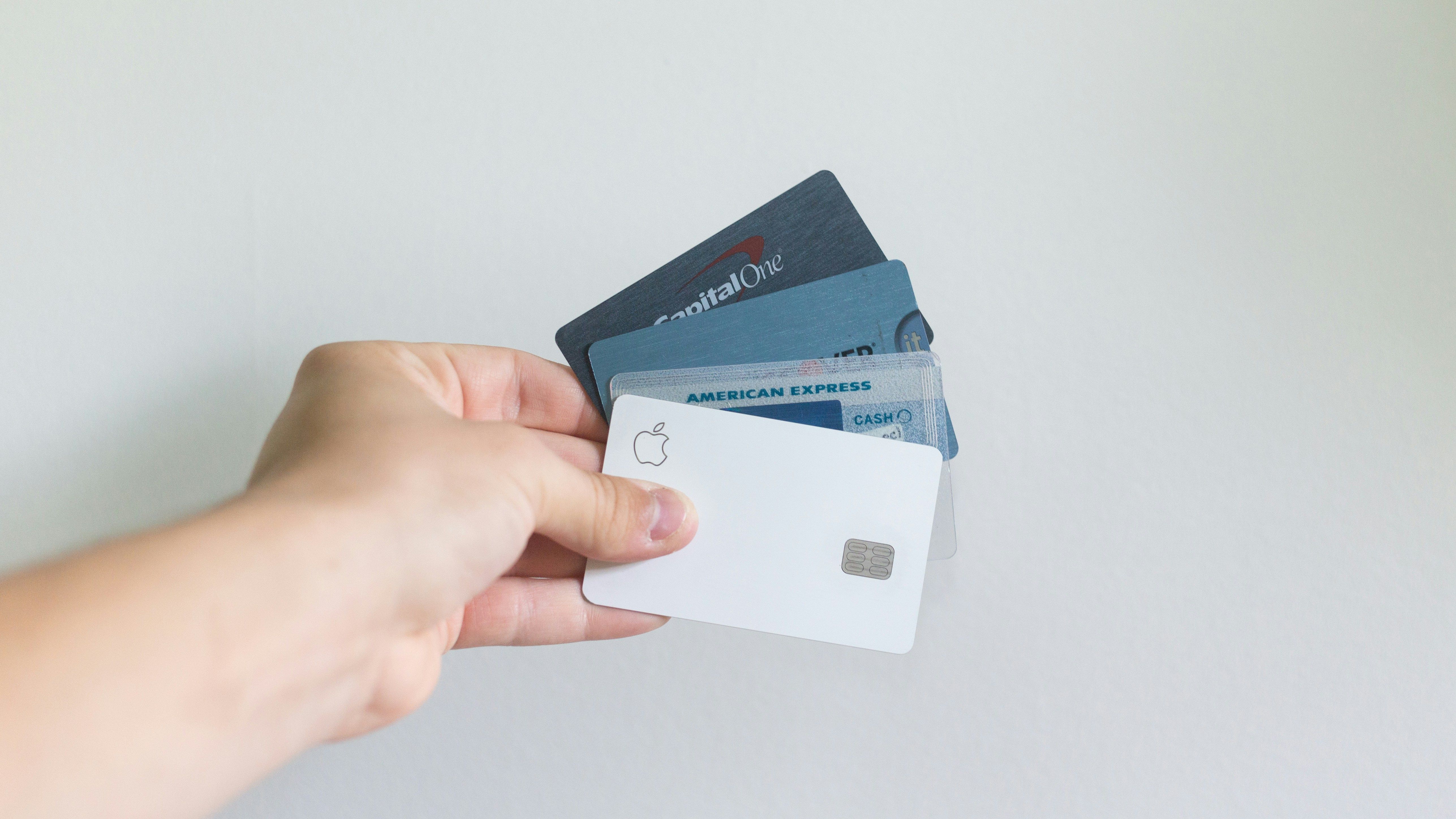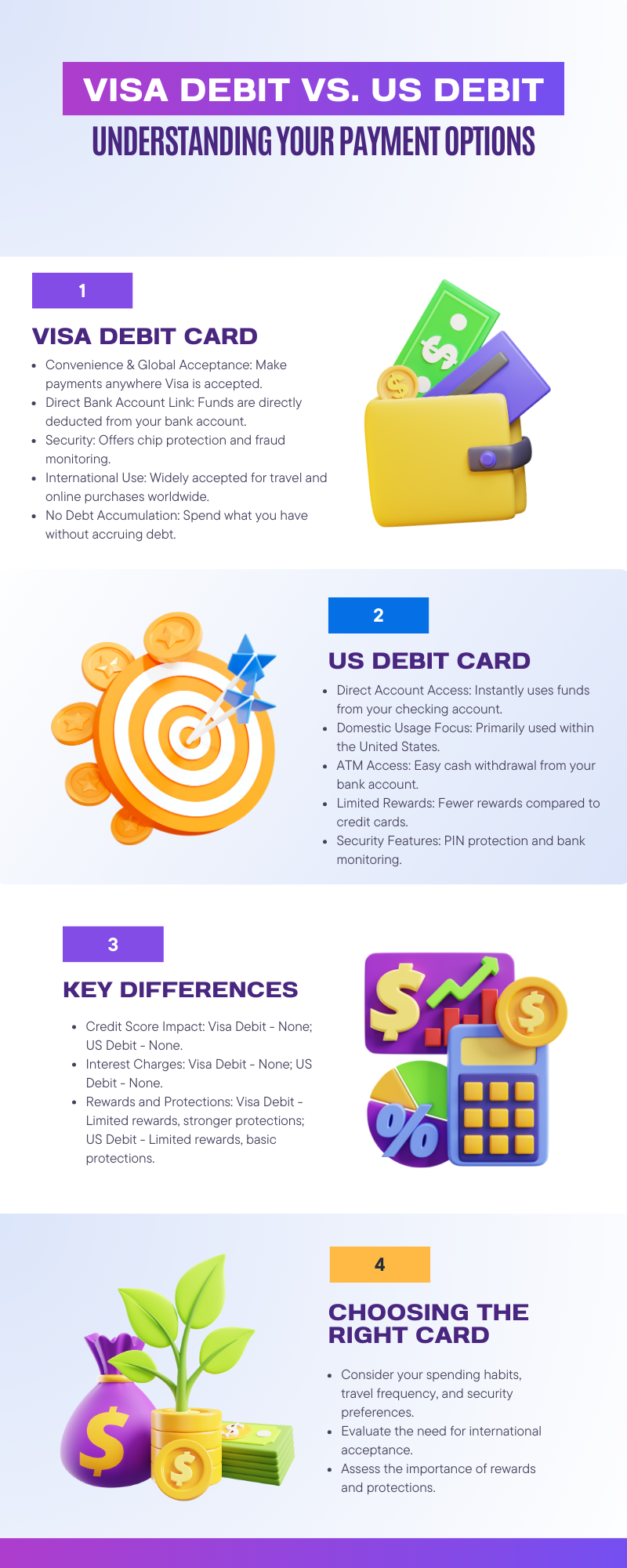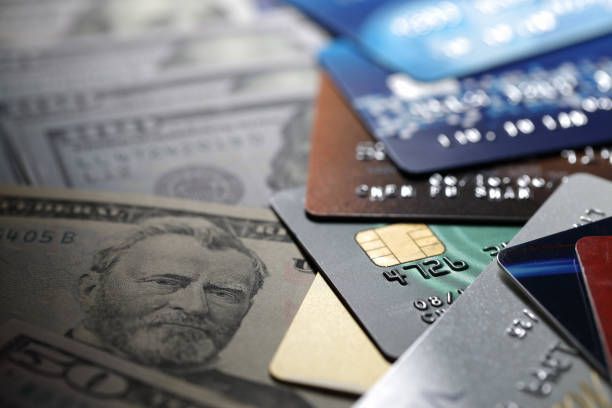Visa Debit vs US Debit Card: A Detailed Comparison
Check out Visa Debit vs US Debit, comparing their functionalities, global acceptance, and security measures. Get insights into choosing the right financial tool based on your financial habits and transaction preferences.
Abhinil Kumar
Author

Definition of Visa Debit and US Debit
In today’s globalized society, financial transactions have become increasingly diverse and intricate. From credit cards to e-wallets, there are numerous methods available for making payments. However, two commonly used terms in the financial world are Visa Debit and US Debit. In this article, we will explore the definitions of these two payment methods, understanding how they work and how they differ from one another.
What is Visa Debit?
Visa Debit combines the global acceptance of Visa with the straightforwardness of a debit card, making it a practical choice for daily transactions. Users can effortlessly make payments online, in stores, or over the phone, with funds drawn directly from their bank account. This direct connection ensures spending is based only on available funds, preventing the accumulation of debt. Its global recognition enhances its convenience, particularly for travellers, providing a reliable payment method worldwide. Visa Debit stands as a straightforward solution for managing expenses, ensuring users enjoy the benefits of digital payment without the complexities often associated with credit.
Benefits of using a Visa Debit card
Benefits of using a Visa Debit card:
- Convenience: With a Visa Debit card, you have the convenience of making purchases without the need to carry cash. You can shop online, pay bills, and make in-store purchases with ease, knowing that the funds are directly deducted from your linked bank account.
- Purchasing power: Visa Debit cards offer you the same purchasing power as a credit card, allowing you to make purchases anywhere Visa is accepted. Whether it’s for groceries, clothes, or travel expenses, you can enjoy the flexibility of using your card for various credit card transactions.
- Lack of credit score requirement: Unlike credit cards, Visa Debit cards do not require a credit check or a certain credit score to be obtained. This makes them accessible to individuals who may not have a credit history or who prefer to avoid credit card debt.
- Flexibility: Visa Debit cards provide flexibility, as they can be used internationally. Whether you’re travelling abroad or making online purchases from overseas retailers, you can rely on your Visa Debit card for secure and convenient transactions.
- Inclusivity: Visa Debit cards are inclusive, catering to both travellers and non-credit card holders. This means that individuals who prefer not to use credit cards or are unable to obtain one can still enjoy the benefits of electronic payments and the convenience of a Visa Debit card.
What is US Debit?
US Debit refers to the use of electronic payment cards that deduct funds directly from a user’s bank account to make purchases. Debit cards have become increasingly popular in the United States as a convenient and secure alternative to cash or checks. Unlike credit cards, which allow users to borrow money and pay it back at a later date, debit cards enable immediate payment by withdrawing funds from the account linked to the card. This method of payment offers consumers a hassle-free and efficient way to make transactions, whether it be in-person at a store or online. With the ability to access funds directly from their banking accounts, US Debit provides individuals with greater control of their spending and avoids accumulating debt. Additionally, debit cards offer a wide array of features and benefits, such as contactless payments, rewards programs, and the ability to monitor transactions in real time, making them an increasingly popular choice for everyday purchases in the United States.
Pros and cons of using a US Debit card
A US Debit card offers several advantages. Firstly, it allows users to make purchases and withdraw cash directly from their checking account, eliminating the need for carrying large amounts of cash. This convenience makes debit cards a safer alternative to cash. Moreover, most US debit cards are accepted globally, making them a convenient option for international travel. In addition, using a debit card helps users track their spending as transactions are immediately deducted from their account balance.
However, there are some drawbacks to using a US Debit card. Firstly, if a user’s card is lost or stolen, there is a risk of unauthorised transactions being made before it is reported. Although most banks have policies in place to protect against fraud, it can still be a hassle to resolve such issues. Another disadvantage is that certain types of transactions, such as booking hotels or rental cars, require a credit card, which can be a limitation when using a debit card.

Visa debit and US debit
Difference between Visa debit and US debit
When choosing between US Debit and Visa Debit, consider your primary needs such as domestic versus international use, the desire for rewards and benefits, and how the card’s security features align with your preferences. For those who frequently travel or make purchases from international merchants, a Visa Debit card offers the convenience and security of global acceptance. Conversely, if your activities are mostly domestic, a US Debit card might serve your needs just as well with the simplicity and direct link to your checking account.
- Issuance and Linkage: A US Debit card is directly linked to a checking account at a bank or credit union within the United States, allowing immediate withdrawal of funds for transactions. A Visa Debit card, while it can also be linked to various types of accounts including checking, savings, or even prepaid accounts, carries the Visa logo, signalling its broader acceptance and utility beyond just a checking account.
- Acceptance: US Debit cards are primarily accepted within the United States, offering widespread convenience for domestic transactions but may not be valid for international use. Visa Debit cards, bearing the globally recognized Visa logo, are accepted worldwide, making them suitable for international transactions and travel.
- Liability Protection: Both card types offer liability protection against unauthorized charges, but Visa Debit cards may come with the added benefit of Visa’s Zero Liability policy, which provides enhanced protection under specific conditions.
- Rewards and Benefits: Typically, US Debit cards do not offer rewards programs, whereas Visa Debit cards might come with various rewards and benefits like cashback, points, or discounts, subject to the issuing bank’s policies.
- Fees: The fees associated with using these cards can vary. US Debit cards might incur fees like ATM withdrawal fees, overdraft fees, and monthly maintenance fees, depending on the bank and account type. It’s important to check with your bank for the specific terms and conditions related to your card.
Security features
The card offers robust security features to protect against unauthorized access and fraudulent activities. It utilizes both chip and magnetic stripe protections, ensuring enhanced security at point-of-sale transactions. The chip is encrypted and generates unique transaction codes for every purchase, making it nearly impossible for hackers to replicate the information. The magnetic stripe on the card contains limited essential data, minimizing the risk of data breaches. Additionally, the card incorporates fraud prevention measures that include real-time transaction monitoring and advanced algorithms to detect suspicious activities. This guarantees a safe and secure experience for the cardholder.
In terms of functionality, the card is designed to accommodate both one-time and recurring payments. It can be used for a wide range of transactions, including online purchases, in-store payments, phone orders, and even cash withdrawals at ATMs. The card offers the flexibility of being either disposable or reloadable, allowing users to choose their preferred option. This gives individuals the freedom to select a card that aligns with their specific needs and usage patterns.
Moreover, the card is complemented by a user-friendly mobile app and online banking system. These platforms provide cardholders with convenient access to their account information, transaction history, and the ability to manage their card settings. Whether tracking expenses or setting spending limits, the mobile app and online banking make it easier than ever to stay in control of card usage.
Conclusion
In the intricate world of financial transactions, Visa Debit and US Debit cards stand as popular methods, offering distinct advantages for users navigating both national and international markets. The distinction between these cards extends beyond mere terminology, touching on their utility, acceptance, and the security they afford to consumers. Visa Debit cards, recognized globally, provide the convenience of a credit card with direct access to bank funds, suitable for a wide array of transactions and bolstered by the credit card network’s extensive reach and consumer protections. On the other hand, US Debit cards, typically preferred within domestic boundaries, facilitate direct account debits without accruing debt, appealing to those valuing budget control.
The choice between using a prepaid debit card, engaging with the broader credit card network, or sticking to a more traditional debit card network, hinges on individual needs—ranging from the necessity for broad acceptance and enhanced security features to the convenience of credit card-like transactions without the risk of accruing interest. Customer service plays a pivotal role in this decision-making process, serving as one of the primary sources of support and reassurance for cardholders navigating their financial options.
Ultimately, whether for domestic use or international travel, understanding the nuances of these payment methods empowers consumers to make informed decisions that align with their financial goals and lifestyle preferences, ensuring a balance of convenience, security, and financial management.


